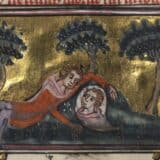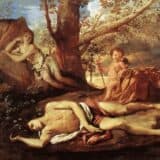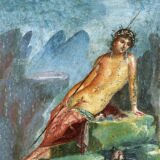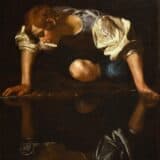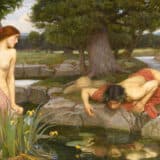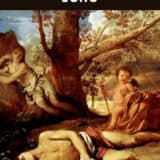The Myth of Narcissus and Echo
There’s more to this story that you might have thought.
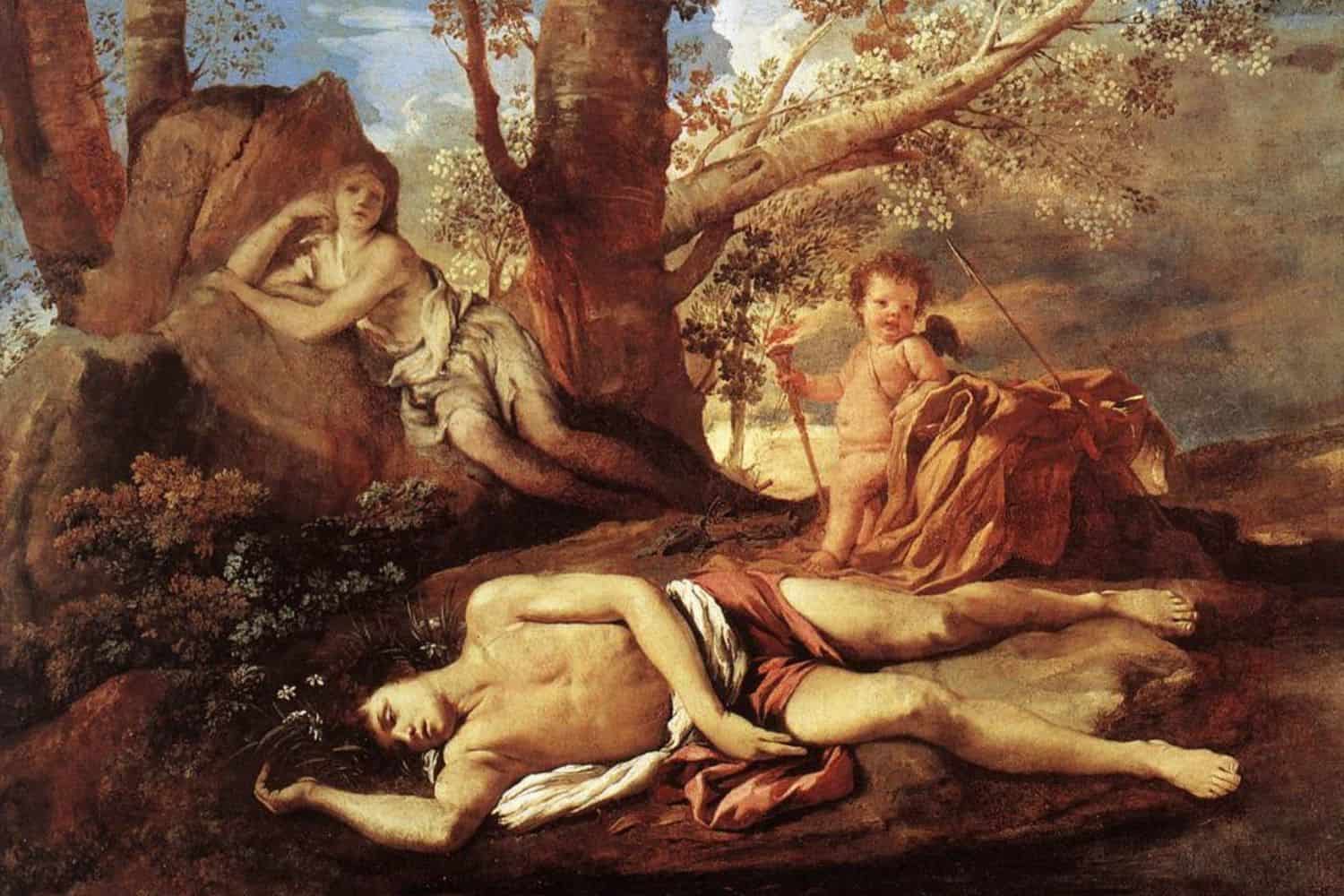
As an Amazon Associate we earn from qualifying purchases. This post may contain affiliate links from Amazon and other sites that we collect a share of sales from. You may learn more here.
The tragic tale of Echo and Narcissus is a captivating myth from Greco-Roman mythology. It’s a story that warns about the danger of self-absorption, losing oneself in a one-sided relationship, and it’s where we get the terms narcissist and echo.
The first known version of his myth was written by Greek traveler and geographer Pausanias in 2 AD in Description of Greece, followed by Nonnus of Panopolis’s mention of him in his epic poem the Dionysiaca and the Greek mythographer Conon’s in Fifty Narrations. But, it’s Roman poet Ovid’s version from Book 3 of the Metamorphoses that is the most well-known.
Here’s a look at the classic myth of Narcissus and Echo.
Who Was Narcissus?
Narcissus (Narkissos) is a character from Greek mythology who fell so in love with his own reflection that he died.
In Ovid and Pausanias’s stories, Narcissus is the 16-year-old son of the river god Cephissus and the blue water nymph Liriope. In Nonnus’s work, he is the son of Selene and Endymion.
In both, Narcissus spurned all romantic partners. Ovid (translated by A.D. Melville) wrote, “and many a youth and many a girl desired him, but hard pride ruled in that delicate frame, and never a youth and never a girl could touch his haughty heart.”
Eventually, as the myth goes, he catches a glimpse of himself in a still pool of water and falls in love with his reflection, not realizing it is himself. He finds the image so alluring that he stays by the pool, staring into the water until he eventually perishes and is transformed into a flower.

Why Did Narcissus Die at the Reflecting Pool?
The most common explanation is that because he cruelly rejected the wrong person and that led to his demise.
Conon wrote, “In Thespeia of Boeotia (a city not far from Helikon) a child was born, Narcissus, very handsome and dismissive of both Eros and lovers. While all the other lovers tried and gave up, Ameinias kept insisting and beseeching. Narcissus did not yield and sent him a sword instead. He did away with himself at Narcissus’ doorway, after beseeching the god to avenge him.”
However, which god lured Narcissus to the pool depends on the author. In Conon’s work, it appears to be Eros. In Robert Graves Discoveries in Greek Mythology, it’s Artemis. And, in Ovid poem, it’s Nemesis.

There is one other, much more moving, explanation of why Narcissus died by the water, and this is provided by Pausanias. In his Description of Greece he writes:
“On the summit of Helicon is a small river called the Lamus. In the territory of the Thespians is a place called Donacon. Here is the spring of Narcissus. They say that Narcissus looked into this water, and not understanding that he saw his own reflection, unconsciously fell in love with himself, and died of love at the spring. But it is utter stupidity to imagine that a man old enough to fall in love was incapable of distinguishing a man from a man’s reflection.
There is another story about Narcissus, less popular indeed than the other, but not without some support. It is said that Narcissus had a twin sister; they were exactly alike in appearance, their hair was the same, they wore similar clothes, and went hunting together.
The story goes on that Narcissus fell in love with his sister, and when the girl died, would go to the spring, knowing that it was his reflection that he saw, but in spite of this knowledge finding some relief for his love in imagining that he saw, not his own reflection, but the likeness of his sister.”
This suggests that what Narcissus was feeling wasn’t self-absorption, but that he was overwhelmed by the emotion of seeing the visage of his sister again. If you’ve ever lost someone, this explanation makes sense. Especially when you consider that there were no photographs at the time, so the pool might have been the only way for Narcissus to see her face.
Who Was Echo?
Echo (Ekho) was a beautiful Oreiad nymph from Mount Kithairon known for her distinct voice. Echo had a particular talent for talking and entertaining with her enchanting voice. So much so that in some myths Pan falls in love with her and in others, he becomes envious of her voice and has it drive the shepherds around her so mad that they literally tear her apart.
Tragically, Echo‘s chatty nature led to her downfall. In Ovid’s poem, when Juno — Jove’s wife and queen of the gods – suspected her husband of sleeping with a bunch of the mountain nymphs and came down to see what was up, Echo kept her talking so the nymphs could escape.
Juno saw through this and told Echo, “Your tongue, with which you tricked me, now its power shall lose, your voice avail but for the briefest use.” Ovid explains that “when speaking ends, all she can do is double back each last word, and echo back again the voice she’s heard.”
In short, Echo is no longer is able to speak her own thoughts. She can only repeat the words and voice of others.

What Is the Narcissus and Echo Myth?
The most popular version of the story begins with Liriope, Narcissus’ mother, consulting the famous seer Tiresias about her son’s future. Tiresias predicts that Narcissus would have a long life but only, “if he shall himself not know.”
Narcissus grows up to be an attractive young man who rejects all potential partners.
One day, while he hunting deer in the woods, the nymph Echo catches sight of him. Like many before her, she becomes infatuated, and follows him through the woods.
But, because she no longer has her own voice, she must wait for him to speak before she can respond. When he calls out for his friends asking, “Anyone here?” Echo takes this opportunity to respond, saying, “here!”
The two speak back and forth like this for a little while, but Narcissus doesn’t realize he’s speaking to the nymph as she’s stayed hidden in the trees. That is until he says, “Join me here” and she runs out of the woods and throws her arms around his neck, startling him.
He responds, “Keep your arms away from me! Be off! I’ll die before I yield to you.” Rejected, she goes into the caves nearby to grieve, feeling so much heartache that eventually her body perishes and all that is left is her voice.
Narcissus, meanwhile, continues on his hunt until, tired from the chase and heat, he lies down by a quiet reflecting pool, lured there by Nemesis (or Artemis or Eros). When the thirsty hunter began to drink from the pool, he falls in love with what he sees looking back at him from the water.
In Ovid’s poem, at first he doesn’t recognize it’s himself. He thinks he sees a beautiful young man, who he tries to embrace by dipping his arms into the water, only to find that each time he does, the person disappears.
Ovid writes, “as he drank he saw before his eyes a form a face, and loved with leaping heart a hope unreal and thought the shape was real… He gazes at his eyes, twin constellation, his hair worth of Bacchus or Apollo, his face so fine, his ivory neck, his cheeks smooth, and the snowy pallor and the blush; All he admires that all admire in him, himself he longs for, longs unwittingly.”
And, for the first time, Narcissus feels the ache of love (or infatuation) and cries out in frustration. “Why, every time I reach my lips towards the gleaming pool, he strains his upturned face to mine. I surely could touch him, so slight the thing that thwarts our love. Come forth, whoever you are! Why, peerless boy, elude me?
Eventually it dawns on Narcissus that he is in fact gazing at his own reflection. This frustrates him further, feeling like he will be the only person he will ever be attracted to. “The image is my own; it’s for myself I burn with love. I fan the flames I feel… my riches beggar me.” At some point, Echo returned to watch the scene, weeping as he wept.
Narcissus beats his chest in heartbreak, and eventually he wastes away, perishing upon the pool’s edge. He is taken then to river Styx where he stares into its reflecting waters. His body is transformed into a white and yellow flower, the Narcissus.

